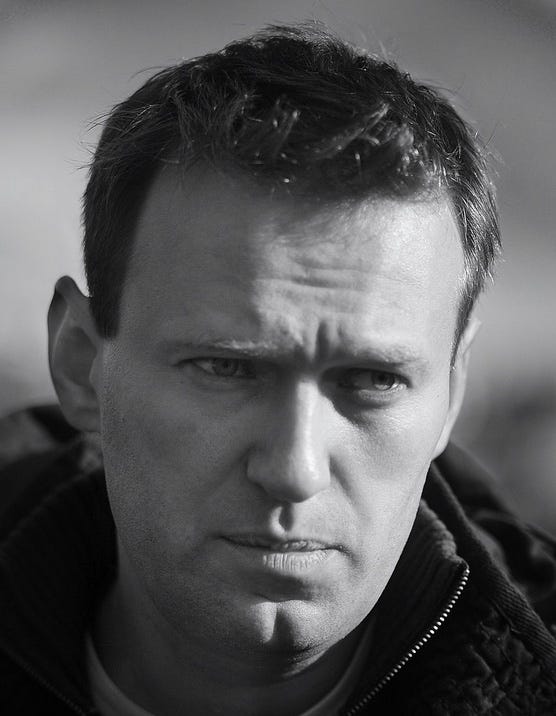February snowscape north of Othello
A martyr’s death in Siberia
Like many of you I awoke this morning to the news that Alexei Navalny, 47 years old—husband to Yulia and father to daughter Dasha and son Zakhar—died earlier today in a Siberian penal colony. Not that the news was a complete shock, but it landed with a thud and I haven’t been able to think of much else since.
By reference, my mind reached for Anna Politkovskaya, the Russian investigative journalist who was poisoned, jailed, and ultimately gunned down in an elevator at her Moscow apartment building in 2006, at the age of 48. I also thought of Palestinian journalist Wael Dahdouh who lost his wife, a young daughter and a teenage son to an Israeli airstrike last year. Dahdough, himself, was badly wounded in an attack that killed his photographer, and then, a few weeks later, in January, he lost an older son and fellow journalist, Hamza, in an Israeli airstrike on their vehicle.
The common thread is in the cloth and character of people who put their lives on the line to tell and report painful truths. Courage is too short a word. The struggle to become brave is hard enough to describe. But to carry the love of others with you into harm’s way because you also love truth, democracy, and human rights requires words beyond courage and bravery. I’m in awe of Navalny’s sacrifice, as I was in awe of Politkovskaya’s, and am in awe of Wael Dahdough’s
Alexei Navalny (photo courtesy Wikimedia images)
The gulf between Navalny’s courage and the Trumpian herd that welcomes Putin’s help is as wide as it is nauseating. I can only pray that someday Navalny’s life and sacrifice will be celebrated from Moscow, Russia to Moscow, Idaho. God bless him and Yulia, and Dasha, and Zakhar.
Navalny was much more than a truth teller. He was a political leader who emerged in 2011 as a prominent and popular opposition leader to Vladimir Putin. He was last seen alive, in prison, eight days ago. Like Politkovskaya and other Russian who spoke or wrote critically of Putin, Navalny was attacked with poison. He became violently ill during a 2020 flight from Tomsk to Moscow—the poisoning confirmed by German doctors four days later, after Navalny was flown by a supporter to Berlin. After he recovered, he returned to Russia and was jailed shortly afterwards. This morning it was Russian authorities who announced he’d collapsed and died after a walk as the “Polar Wolf” prison at which he’s been confined since early December.
The accounts of attacks on independent Russian journalists and Putin critics are legion by now. Politkovskaya is but one of more than a dozen Russian journalists who’ve been killed in what the Committee to Protect Journalists describes as “contract-style murders” since Russian President Vladimir Putin took office.
It’s not too soon to wonder how Navalny’s death will be received and how it will influence this year’s U.S. elections. It comes at a time where there is increasing support for Putin among the MAGA-wing of the Republican Party which, for all intents and purposes, is the Republican Party. Witness the Republican Speaker of the House Mike Johnson’s swift decision this week to block a vote in the House on the Senate-passed bill (70-29) to replenish financial support for the Ukrainian military.
I don’t think the diagnosis for the growing influence of Putin on Congressional Republicans is any more complicated than “the enemy of my enemy is my friend,” in which Biden and the Democrats are regarded as the real threat to Trump and Republicans recapturing control of the White House and the Senate. Power is the crack cocaine of the Trumpian Republican Party in these times.
The gulf between Navalny’s courage and the Trumpian herd that welcomes Putin’s help (and seems to admire his methods) is as wide as it is nauseating. I can only pray that someday Navalny’s life and sacrifice will be celebrated from Moscow, Russia to Moscow, Idaho. God bless him and Yulia, and Dasha, and Zakhar.
—tjc









